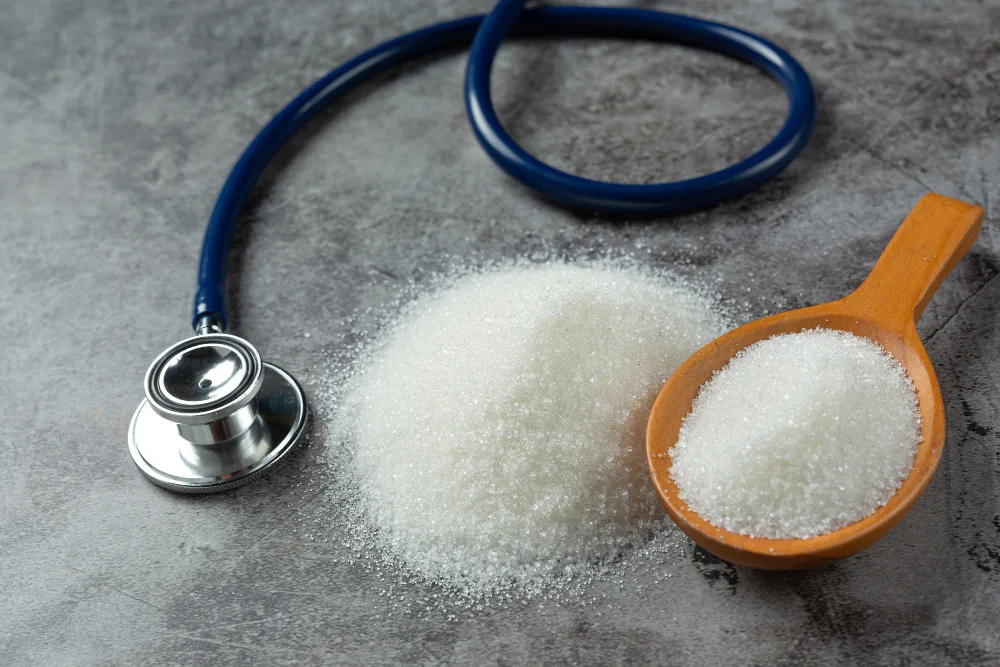While a little sweetness may seem harmless, too much sugar can negatively affect our health in surprising ways. The American Heart Association recommends that women consume no more than 6 teaspoons of sugar a day and men, no more than nine. However, the reality is that many people consume well beyond these limits.
In this post, we’ll explore five warning signs of eating too much sugar and how to recognize them.
The Hidden Dangers of Sugar in Your Diet
Sugar is not just found in desserts—it’s often hidden in many ultra-processed foods under various names. It can be tricky to spot sugar in the ingredient lists of your most liked foods, making it even harder to manage your intake.
Common Hidden Sugars
Sugar can appear on food labels under different names, making it difficult to avoid. Here are some common terms for sugar:
- Sucrose (table sugar)
- Glucose, dextrose, or glucose syrup (often in processed foods)
- Fructose (also know as fruit sugar or high-fructose corn syrup)
- Corn syrup (used in soft drinks and processed snacks)
- Maltose (found in bread and beer)
- Lactose (milk sugar in dairy products)
- Honey, maple syrup, agave syrup (natural sweeteners that still contain sugar)
Anything ending in “-ose” or labeled as a syrup or sweetener is most likely a form of sugar.
Signs You’re Overeating Sugar
1. Weight Gain and Constant Hunger
Excess sugar can lead to rapid weight gain because it contains a huge number of calories without providing lasting satiety. When you eat sugary foods, your blood sugar spikes quickly but drops soon after, leaving you feeling hungry again. This can lead to overeating, which contributes to weight gain over time.
2. Acne and Skin Problems
Your skin may be showing signs of sugar overload. When you eat sugar, it affect your insulin levels to rise. This spike also increases the production of insulin-like growth factor 1 (IGF-1), which can clog your sebaceous glands, leading to pimples, acne, and other skin issues.

3. Cravings and Mood Swings
Sudden cravings for sugary snacks or experiencing mood swings may indicate high sugar consumption. When your blood sugar rises quickly, your body releases insulin to bring it back down. However, this can lead to a blood sugar crash, making you feel more aggressive.
4. Inflammation and Weak Immune System
Too much sugar weakens your immune system and promotes inflammation in the body. When you consume excess sugar, it feeds harmful bacteria in the gut, leading to the production of endotoxins. These endotoxins enter your bloodstream and cause silent inflammation, which can boost aging and lower your body’s ability to fight infections.
5. Accelerated Aging
Sugar can make you age faster. High sugar intake leads to the formation of Advanced Glycation End Products (AGEs), which damage collagen, the protein responsible for keeping your skin firm and elastic. This results in stiffer, more brittle skin and tissue, causing wrinkles and other signs of aging to appear prematurely.
What to Do After You’ve Eaten Too Much Sugar
Sometimes, I find myself realizing that I’ve eaten too many sugary foods, but it’s hard to resist due to my craving for sweet flavors. However, there are lots of things you can do to recover after consuming too much sugar.
How to Know You’ve Overdone It
- Energy crash: Sudden fatigue after consuming sugary foods due to a drop in blood sugar levels.
- Fatigue and bloating: Symptoms that mainly indicate excess sugar intake.
Steps to Recover After Overeating Sugar
1. Say a ‘Big No’ to More Sugar
- Avoid more sugar: Reaching for another sugary snack will only lead to another crash.
- Choose protein and fiber: Opt for snacks like apple slices with peanut butter (no added sugar) to stabilize blood sugar.
2. Go for Whole Foods, Not Processed ones
- Focus on whole foods: Fresh ingredients are better than processed foods which often hide sugar.
- Avoid processed snacks: Foods like cereal and granola bars can contain hidden sugars.
- No need for detox: A balanced diet will naturally bring your body back on track.

3. Hydrate for a reason
- Drink plenty of water: Flush out excess sugar by drinking lots of water and low-sugar fluids.
- Eat water-rich foods: Include foods like watermelon, cucumbers, strawberries, and yogurt to help hydrate.
- Get electrolytes: Calcium, magnesium, potassium, and sodium are essential—found in leafy greens, nuts, seeds, and coconut water.
4. Take a Walk
- Exercise to balance blood sugar: Walking or exercising helps stabilize blood sugar levels and reduce insulin spikes.
- Aim for regular activity: Incorporate cardio and strength training into your routine for better weight management and heart health.
5. Meditate
- Calm your mind and body: Practicing yoga or meditation can help reduce blood glucose levels and ease stress after a sugar overload.
Final Note: Time to Reassess Your Sugar Intake
Recognizing these signs can be a wake-up call to cut back on sugar. Excessive sugar consumption may not only contribute to weight gain but also impact your mood, skin, and immune system, and accelerate the aging process. By being more mindful of the hidden sugars in your diet and choosing healthier alternatives, you can start to regain control over your health and well-being.
It’s time to break up with sugar and prioritize a diet that supports long-term health!
Must read: The link between ultra-processed foods and diabetes risk
